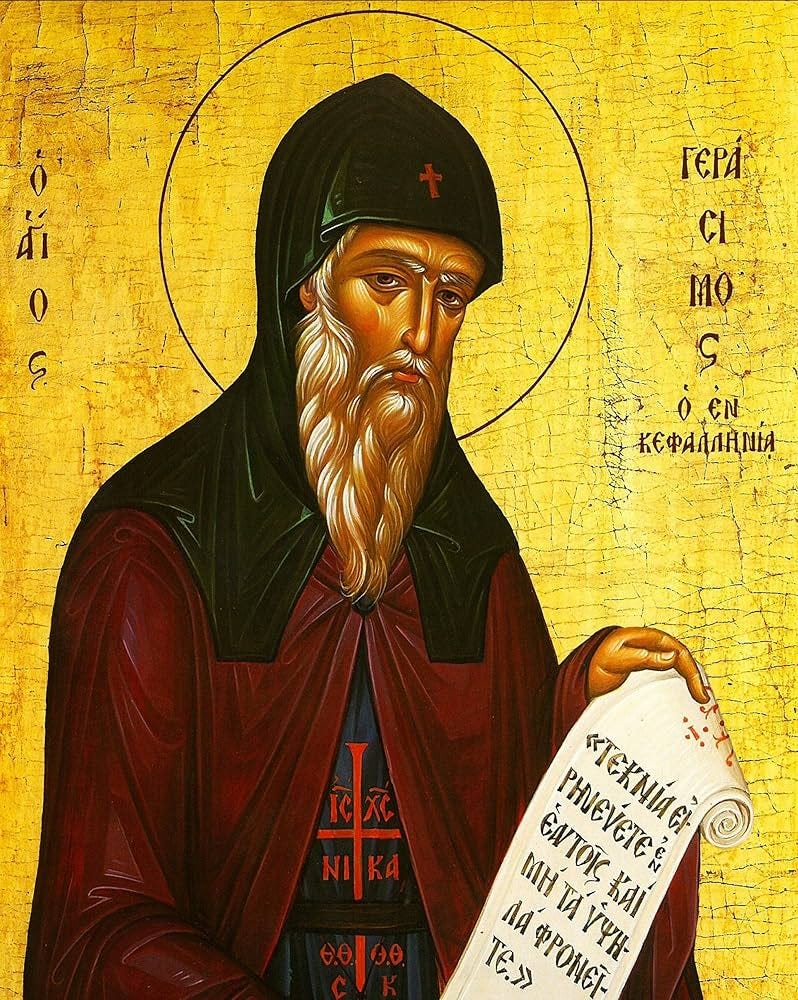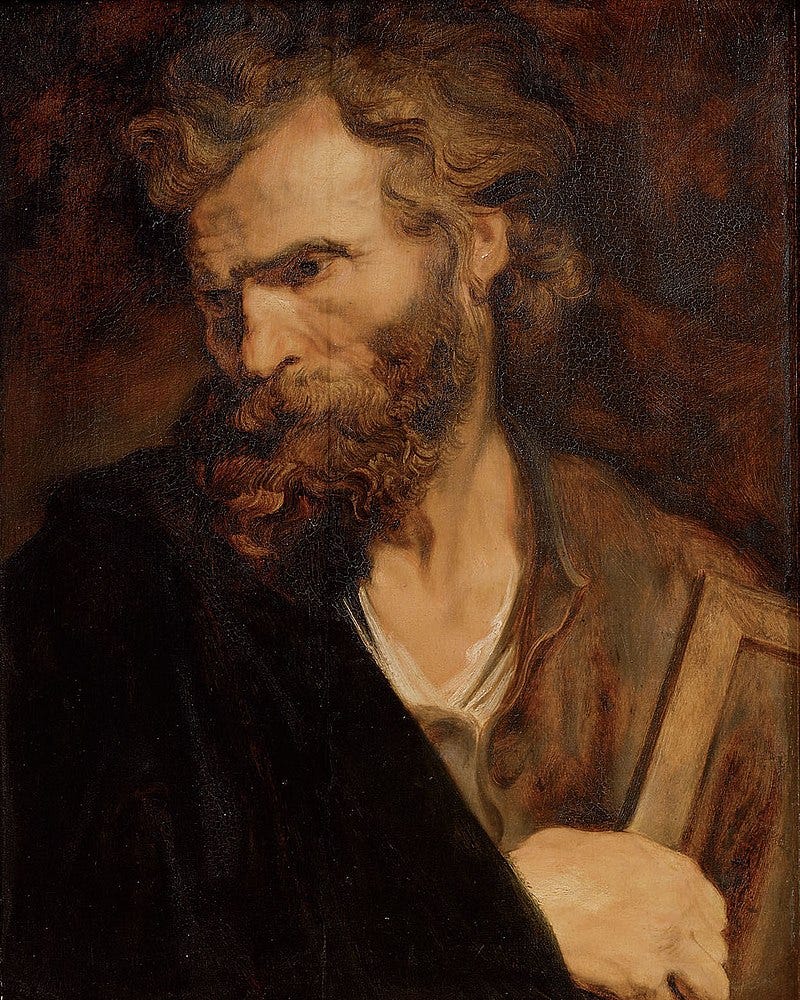Daily Readings | 4 March 25 | An Apostolic Teaching in Jude (17–19)
Scripture Readings: Gen 1:14–23; Prov 1:20–33
Saint/Feast Day: Gerasimus, Venerable
As many disciples wanted to join Gerasimus, he built a monastery for all of them near the Jordan River, and lived there in great asceticism. The monks there never lit fire in their cells but endured the cold and Gerasimus himself would not eat throughout Great Lent, taking only the food of the Holy Communion.
L. Farley, Eastern Saints.
Readings: Gen 1:14–23; Prov 1:20–33
Today, we continue our examination of Jude focusing on another quotation (17–19). This section begins with further warnings and then progresses to exhortations. This comes just after the scathing condemnation of the ungodly in the community, quoting 1 Enoch.
He begins this transition with an appeal to the Apostles:
|17| But you must remember, beloved, the [predictive words (ῥημάτων τῶν προειρημένων)] of the apostles of our Lord Jesus Christ; |18| they said to you,
“In the last time there will be [deceivers (ἐμπαῖκται)], following their own ungodly (τῶν ἀσεβειῶν) passions.”
|19| It is these who set up divisions, worldly people (ψυχικοί), devoid of the Spirit (πνεῦμα μὴ ἔχοντες).
This transition, though, is not speaking to those in the community about themselves. Rather, it is continued reproach of the “ungodly” in the community.
Before we discuss what exactly this additional reproach is, there are a few details that must be examined.
Is Jude an Apostle?
Based on the phrasing here, on first read it could be easy to see this statement as exclusive. Jude is providing an unknown—to us, anyway—quotation from “the apostles of our Lord Jesus Christ,” which certainly seems like he is not including himself. One might expect the author to throw in an “I” or indicate that he should be considered part of this group.
That said, this could also be understood as a direct appeal to some form of oral tradition that was circulating at the time of the letter’s composition. If this was a commonly known apostolic—or at the very least, a phrase that was attributed to the apostles—saying, then the phraseology is not necessarily exclusive.
It could be a reference to a common teaching that was circulating in the Early Church, and this is the only record we possess. As such, it would not necessarily exclude the author from the apostles.
As we discussed in the first Daily Readings of Jude, though, the authorship of this epistle is difficult. Is it Jude, the brother of James, the half-brother of our Lord? Is it a different Jude? This phrase could swing either way. It could indicate that this is a different Jude, not one of the apostles. Or, he is appealing to a tradition, and it does not reveal anything about himself or his title.
The Quotation
This is the only record we have of this quotation. This is not an uncommon aspect of Scripture, though, where something is referenced—a tradition (1 Cor 15:29) or text—and we have no other attestation of it.
For instance, Paul appeals to the words of Christ in Acts 20:35,
“It is more blessed to give than to receive.”
This is not a known saying amongst the logoi of Christ from the canonical Gospels. This is potentially Jesus tradition.
As for this quotation in Jude, the closest parallel we have is 2 Peter 3:3
First of all you must understand this, that [deceivers (ἐμπαῖκται)] will come in the last days with [deceiving (ἐμπαιγμονῇ)], following their own passions (τὰς ⸄ἰδίας ἐπιθυμίας αὐτῶν).
But, this is problematic because, as we have seen, 2 Peter seems dependent on Jude in places.
One might think deceivers/mockers/scoffers would be a key to understanding the potential parallels, but this word (ἐμπαῖκται, empaiktai) appears in the NT only here and 2 Peter 3. In the LXX, it only shows up in Isa 3:4,
καὶ ἐπιστήσω νεανίσκους ἄρχοντας αὐτῶν, καὶ ἐμπαῖκται κυριεύσουσιν αὐτῶν.
And I will place youths as your rulers, and deceivers/mockers/scoffers will lord over you.
As tempting as it might be to assume this lordship language accompanied with deceivers might be a path for understanding the origins of the quotation, this appears more coincidental than related.
The word—from my brief search—does not appear in the OTP. As such, this may well go back to the Apostles, and it is not dependent on another phrase.
Now, the reason for this quotation cropping up here is apparent when we look at the repeated use of “godless” in the epistle. This quotation, just like 1 Enoch 1:9, is being applied to those who rejected Jesus as Lord and squandered their gift of grace from God. But this time, it is used in relation to their “passions” or “desires.”
The purpose of the quotation is also relatively clear: the Apostles warned you these types of people would attempt to infiltrate the Church and lead it astray for their own benefit.
The quotation is then followed up with a pinch of explanation. These ungodly people will divide and lack the Spirit—akin to 1 John 3:24, 4:13. Those in the community, those who abide in him—to use Johannine language—will have the Spirit, and they will not seek their own “godless desires.”
Concluding Thoughts
So, continuing his line of thought, Jude further chastises the ungodly of the community. He has referenced multiple images from Jewish history; he has appealed to nature; he has quoted 1 Enoch; and now most recently he has employed apostolic tradition.
The epistle is making it clear to the readers that those who cause others inside the Church to sin or—worse—to fall away will be met with divine judgment. It is his wish and desire to encourage those who have encountered these “ungodly” infiltrators to stay strong in the faith and resist temptation.
If you have enjoyed this brief reflection on today’s readings and wish to read more about NT studies, would you kindly like, share this post, and subscribe.







